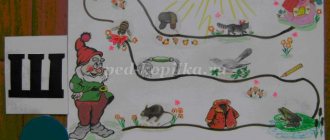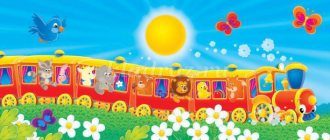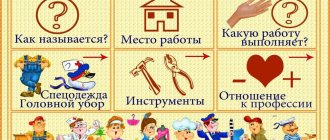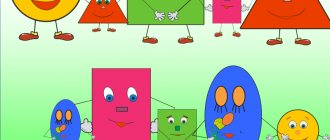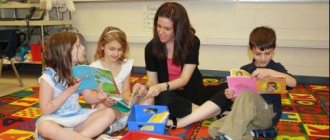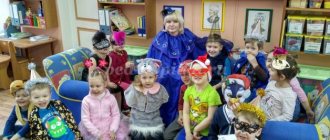Speech therapy classes
— a section with notes on group, frontal, individual speech therapy and logorhythmic classes, as well as integrated classes, master classes on non-traditional teaching methods. We are confident that the materials posted here will be interesting and informative not only for specialists in children's educational institutions, but also for parents who show a sincere interest in the development of their child.
Experienced specialists share their knowledge here, and for beginning speech therapists, the presented notes will help them plan their classes correctly and in a fun way.
Classes with a speech therapist. Materials and notes.
Contained in sections:
- The work of a speech therapist. Speech therapy 8464
Includes sections:
- Differentiation and automation of sounds 4121
By groups:
- Senior group
- Preparatory group
- Middle group
- Junior group
Showing publications 1-10 of 9591. All sections | Speech therapy classes
New
Photo
The best
Summary of the speech hour in the preparatory speech therapy group “Berries and Mushrooms. Forest in autumn" Topic: "Berries and mushrooms. Forest in autumn"
Goal: clarifying knowledge on the topic. Objectives: 1. Consolidate ideas about the forest and plants growing in the forest. Clarification, expansion and activation of vocabulary on the topic. Improving the grammatical structure of speech and mathematical concepts. 2….
Subgroup speech therapy session on the formation of the syllabic structure of the word “Let's help Snow White” Subgroup speech therapy session on the formation of the syllabic structure of the word in 6-year-old children with general speech underdevelopment. Speech therapist teacher : Elena Vasilievna Kovtun. MBDOU "Kindergarten No. 70"
Ryazan.
Topic of the lesson . Let's help Snow White. Target. Overcoming syllable structure disorders...
Summary of a subgroup lesson in a senior speech therapy group at a preschool educational institution
Subgroup lesson with preschoolers of the senior group on the topic: Differentiation of sounds and letters Z-Z
Description: This lesson was conducted in the senior speech therapy group. When preparing the lesson, the emphasis was on the development of the phonetic-phonemic aspect of speech in children. This lesson will be useful for speech therapists and preschool teachers. Purpose: Comparison of sounds according to acoustic and articulatory characteristics. Objectives: 1. Improving phonemic perception.
2. Development of sound analysis, tactile sensations and fine motor skills. 3. Improving visual perception, spatial orientation and constructive praxis. 4. Consolidation and spelling ZHI – SHI. Progress of the lesson
Organizing time.
Greeting - logorhythmic exercise “Hello palms”. Speech therapist : The children who correctly named the first sound in the word that I pronounce will sit down. Listen carefully. Duck, frost, belly, notes, marten, oriole, caviar, air, doctor, viburnum, bison, cat. (Children answer in turn and sit down. Each child has a badge with his letter pinned on his clothes)
.
Game “Colorful Journey” In front of each child on the table there is a card with nine squares of different colors and a Kinder Surprise figurine.
Children must move the figure across the cells, starting from the central square. Speech therapist: Let's go on our journey.
Be attentive, listen in which direction you should move. Right, up, left. Where are you staying? Children: On the blue square, etc. Topic message. Speech therapist: Listen to the song of one insect: Zu-zu-zu! - The floor is below... I'm crawling along the ceiling To visit the black hook... Oh, how hot, zu-zu-zu! Oh, how my eye itches! Well, guys, have you guessed who it is? Children : This is a fly. We post a picture of the answer on the board. Speech therapist: And here’s another poem: A bumblebee buzzes to a bumblebee: “Friendly place! There are a thousand specks of dust on you! You’ve even stained your whole belly with pollen.” Adjusting her vest, the bumblebee buzzes in response: “This is not pollen at all, This is face powder. On my sides and on my back I carry her to my w-wife!” What sounds are repeated in the songs of the bumblebee and the fly? Children: Sound [zh] and [z]. Speech therapist : Today in class we will talk about them. What do they have in common? Children : These sounds are consonants, voiced. Speech therapist : How are they different? Children: When pronouncing the sound [z], the tongue is at the bottom, [z] at the top. The sound [z] is whistling, it can be hard and soft, and the sound [z] is hissing and always only hard. Isolating sounds by ear. The work is carried out in the form of a competition between two teams. The “Zhukov” team must catch the sound [zh] (clap their hands), and the “Flies” team must catch the sound [z]. The speech therapist dictates the words: forget-me-not, lampshade, zoo, dragonfly, snakes, animal, bison, cranes, whatnot, squeezed, leather, sunset, jasmine, carnations, iron. Making sentences from given words. Crow comes to visit the children - a hand puppet.
The teacher plays out the arrival of this character. Speech therapist: The postman crow brought us letters.
But all the words in them are mixed up, and I don’t understand anything. Help, guys! - beetle, buzz, flower, above; - jacket, hang, hanger, on; - Zoya, collect, garden, forget-me-nots, in; - live, in, monkeys, zoo. Exercise “Complete the letter” Speech therapist: Look, the crow brought us something else. (Cards with images of letters that have missing elements are displayed on the board. Children complete the letters)
.
Comparison of letters. Speech therapist (shows letters and pictures)
.
Guys, look what the letters Z and Z look like? • The snowflake has become the letter Z, the Sun will not melt it anymore. •This letter is wide And looks like a beetle, And besides, like a beetle, It makes a buzzing sound. • Z – a simple curl, Like a spring or shavings. • Look at the letter Z, it’s just like the number three. Game "Unusual Constructor". Children are divided into 2 teams and are engaged in constructing the letters Z and Z from parts on a flannelgraph. Captains with the Z and Z badges are constantly at the flannelgraph, the rest of the children are called in turn. Exercise “Tricks of the Literary Man.” Speech therapist: Guys, I made up words for you with the letters Z and Z. But what is this? The letters have disappeared. Whose tricks are these? I guessed! This angry, angry - angry, hungry - starving Bookworm gobbled them up for lunch. Help me restore my words. How do we know where the letters Z and Z were? (draws the children’s attention to the magnetic board with the words): ko...a, ...aba, ro...a, ...uby, ...amok, ...uk, lu...a, past...a, ...and. Game "Mouse Peak". This is a game for developing tactile sensations. Mouse Peak (a hand puppet) comes to visit the children and asks the children to help him sort out the supplies in his pantry. All the bags are the same, and he forgot where everything was. But the bags cannot be untied; children must feel what is inside (millet and corn) by touch. If the child determines that it is millet (corn), then the mouse asks what kind of porridge can be cooked from millet (corn). The child answers: “millet” (“corn”). Consolidation of spelling ZHI and SHI. Speech therapist : Now the crow and I will tell you the fairy tale “How the letters quarreled.” Once upon a time there were letters, they lived without grieving, everyone was friends with each other and never quarreled. But then one day we met on a narrow path two letters Zh and Sh with the letter Y. She recently broke her leg and walked with a cane. A Zh and Sh were terribly important and firm in their convictions, and never under any circumstances showed softness or compliance. They didn’t want to give way to the poor letter Y and pushed it off the path. And they hissed, it’s not for nothing that they are hissing. The letter Y began to cry, was offended and vowed never to stand next to these evil ones. The letters Zh and Sh found out about this and panicked: who would be friends with them instead of the letter Y? They began to look for a replacement for her and persuaded the smiling, quiet letter I to stand instead of Y. Therefore, in the words awl, hedgehogs, belly, pears we hear the sound [s], and we always write I. Copying words. Speech therapist: The crow brought us more letters. Take the cards out of your envelopes and write down the words. Underline the rule. Summarizing. Speech therapist: And now we will read how we worked with you today. (Puts the children in a row. It turns out the word “smart guys”). Well done, you did a good job!
We recommend watching:
Summary of an individual educational activity with a 5-6 year old pupil on sound pronunciation correction Summary of a subgroup lesson for children 5-7 years old in kindergarten on sound automation [P] Summary of a subgroup speech therapy lesson in an older group on the topic: Family Subgroup speech therapy lesson on the formation of phonemic functions in an older group children's group
Similar articles:
Summary of educational activities in the older group of children with severe speech impairments on the topic: “Sounds S - Z”
Summary of educational activities in the senior group of children with severe speech impairments on the topic: “Sounds S - Sh”
Summary of a subgroup GCD to eliminate disturbances in sound pronunciation in children of the older group with severe speech impairments
Summary of educational activities in the senior speech therapy group on the topic “Cossacks and their traditions”
Logorhythmic lesson for children of senior preschool age with special needs on the topic: “What types of transport are there?”
Speech therapy classes – Speech therapy class “Winter”
Publication “Speech therapy lesson...” Goal: to develop children’s knowledge about winter and its signs Tasks: to develop a directed stream of air, to conduct articulatory gymnastics, to develop children’s vocabulary on the topic “winter,” to consolidate children’s knowledge about warm clothes, winter activities, animals in the winter forest and “New Godet" Teach...
Image library "MAAM-pictures"
Summary of a comprehensive lesson in the speech therapy group “Autumn” preparatory to school Goal: to consolidate children’s ideas about the characteristic signs of autumn and autumn phenomena. Objectives: Educational: - consolidate children’s knowledge about the signs, periods and months of autumn; remember proverbs and sayings about autumn; Developmental: - develop observation, cognitive...
Summary of a speech therapy lesson with 2nd grade students with severe speech impairment “Vowel letters of the 1st and 2nd row” Topic: Vowel letters of the 1st and 2nd row. Purpose: to clarify the similarities and differences between the vowels of the 1st and 2nd rows. Objectives: 1. introduce the sound composition of vowel letters of the 2nd row; 2. learn to correlate vowel sounds with letters; 3. learn to identify by ear and correctly use the first vowels in writing...
Summary of a logorhythmic lesson with children of the preparatory group “Sports” Synopsis of a logorhythmic lesson with children of the preparatory group. Topic: Sports. Goal: to overcome speech disorders in children through the development and correction of the motor sphere in combination with words and movement. Objectives: Correctional and educational: 1. To consolidate children’s knowledge about winter…
Summary of a group speech therapy lesson for older children. Topic: “Sound [С], [Сь].”
Summary of a group speech therapy lesson for older children.
Topic: “ Sound [С] , [Сь]”.
Target:
Teach
children to distinguish between the sounds [s] and [s]
;
strengthening the correct articulation and pronunciation of sounds [s] , [s].
Tasks :
Correctional and educational: Practice differentiating sounds
by hardness - softness based on visual, auditory and kinesthetic sensations;
learn to determine the place of sound in a word
, do
a sound analysis of words
, determine the number
of syllables
in a word and their order, lay out a diagram;
Correctional and developmental: develop coherent speech, general and fine motor skills, visual coordination, attention, memory, thinking.
Correctional and educational: developing skills of independence and initiative.
Equipment:
cards with the letter
“C”
, cards in blue, green, red, pictures with animals and objects, a ball.
Progress:
1. Organizational moment:
Speech therapist
:
- Guys, I'm glad to see you! Hello! Let's remember the speech rules that help us control our speech. (repeat speech rules, speech therapist’s voice is calm
, the conversation proceeds with the movement of the hand, from top to bottom, repetition begins with inhalation)
- Well done! Let's move on to breathing exercises ( "Ball"
,
“Let's blow on a snowflake”
,
“Singing vowels” (A, O, U, I)
.
- Okay, now let’s do articulation gymnastics ( “Brushing our teeth”
(mouth open and closed,
“Rock”
,
“Window”, “Clock”
,
“Horse”
,
“
Mushroom ”
, great, you’re doing great. Let’s play puppet theater
(facial gymnastics)
.
- Very good, now let’s do some relaxation (children lie down on the carpet, teacher - speech therapist
read a relaxing verse).
2. Main part:
Speech therapist
:
- Well done. Go to the chairs. Look who it is? ( speech therapist
shows the picture “Elephant”).
That's right, elephant. (pronounce the word, emphasizing the sound [C] )
What is the first
sound in this word
?
([C], shows a picture with the letter [C], and what kind of sound is it, hard or soft
? When we pronounce this
sound
, do we
“smile”
or not? (if it’s hard
don’t smile
; if it’s soft,
we smile
). Correct. this
sound is hard
, what color will we use to denote it
(hard - blue, soft - green)
. Well done! Look, who is this? (shows the picture
“Goose”
, correctly. Tell me in the word goose,
what is the sound [S]
?
(soft and is indicated in green)
.You said everything correctly, today we will get acquainted with
the sound [C] and its friend the sound [Сь]
.
— Let's play the game “Stomp and Slam”
, I will name the syllables, and when you hear the hard
sound [С], you will stomp
, and when you hear the soft
sound [Сь], clap
.
( the speech therapist
names the syllables SA - SYA, SO - SE, SU - SYU, SY - SI)
Speech therapist
:
- Well done. Look ( speech therapist
distributes cards with three squares, which mean the beginning, middle and end of the word, you and I will look for where in the word
the sound [С]
, [Сь] is located.
I will name the words, and you put cards in the places where you hear this sound
, if
the sound is hard - a blue card
, if the sound is soft - green
(catfish, orange, goose, dream, bus, fox)
.
Speech therapist
:
- Well done! Let's play, stand in a circle. The game is called "Say the Word"
.
I will throw the ball, and you catch it and call the word with the sound [С]
, [Сь] and throw it back
(play)
.
Speech therapist
:
- Fine. Sit back down at the tables. Let's do finger gymnastics "Transport Counting"
.
(finger exercises are performed)
Look what kind of fish this is, does anyone know? (shows a picture - catfish)
.
This is a catfish. Now we will try to make a diagram of the word “COM”
, remind us what hard
sounds
(blue card, soft
sounds
(green card), vowel
sound (red card)
.
(make a diagram of the word, pronouncing each sound )
.
Breathing exercise:
"Harmonic". I. p. - stand straight, lower your arms. Place your palms on your tummy and take a deep breath through your nose. Hold your breath for 1-2 seconds. Exhale through your mouth. Development of exhalation force. Developing the correct direction of the air stream along the midline of the tongue
"Cold wind". Having drawn air into your lungs, blow forcefully through your lips extended forward with a tube. Bring the back of your hand to your mouth. You should feel a sharp, beating cold stream.
Exercises for lips and facial muscles
Game exercises
"Smile". “We are glad to meet a friend.” Stretch your lips in a smile to the limit and hold them in a tense position for some time. The teeth are closed. Repeat 3-4 times. "Cranky monkeys." Movements with closed lips to the right and left. (If you have difficulty, help with your index fingers.)
Exercises to flatten and strengthen the lateral edges of the tongue
"Track". Place your wide, spread tongue on your lower lip and hold it in this position for a count of 5.
“The tongue is looking for a crack in the fence.” Extending the spread tongue between the teeth and biting it. (Teeth marks should remain on the tongue.)
“The tongue is sleeping on the crib.” Descent of the back of the tongue. Press the tip of the tongue against the lower incisors and lower the back.
Note. In case of difficulty, ask the children to cough and yawn, while the soft palate involuntarily rises and the root of the tongue falls. You can interest children by offering to meet or say hello to the little tongue.
Development of phonemic awareness
Isolation of the sound [s] against the background of syllables and words among sounds that are distant in acoustic and articulatory characteristics.
Game "Catch the Sound". The child should clap his hands when he hears the sound [s]. First, the teacher pronounces the sounds [l], [s], [r] [s], [l], [m], [b], [s], then the syllables la, so, ro, su, pa, su, sy , ba.
If a child identifies a sound from a sound or syllabic series, the words poppy, cheese, souk, shelf, son, bun, lamp, catfish are given.
Development of the voice and switchability of the organs of the articulatory apparatus
Pronunciation of vowel sounds with changes in the strength and pitch of the voice.
“Let’s sing a lullaby to the doll”: a-a-a-a-a-a-a-a-a. “Teeth hurt”: o-o-o “Steam whistle”: o-o-o.
3. Summing up:
- Well done! We did everything right. Tell me guys, with what sounds
Today we got to know each other ([С], [Сь], what color indicates a hard
sound
(blue, soft (green, vowel
(red)
. And what we did today
(I list the children)
. Thank you guys for
the lesson
, see you!
